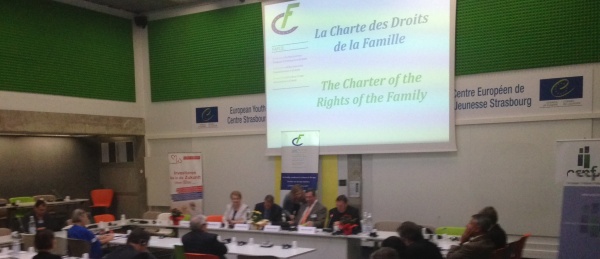The Secretary of the Dicastery, Msgr. Jean Laffitte, in Belgium and in Hungary to speak about the Charter of the Rights of the Family, on its 30th Anniversary

Replacing H.E. Cardinal Peter Erdo, President of the Council of European Bishops’ Conferences, Primate of Hungary and Archbishop of Strigonio-Budapest, unable to attend, H.E. Bishop Jean Laffitte, Secretary of the Pontifical Council for the Family, spoke yesterday, Wednesday, October 9th, in Budapest, at the Conference organized by the Family Commission of the Hungarian Catholic Bishops’ Conference, on the 30th anniversary of the Charter of the Rights of the Family.
Bishop Laffitte already spoke on the theme of reading the Charter of the Rights of the Family within the Magisterium of the Catholic Church and in comparison with Canon and Civil Law, on Tuesday, October 1st, in Strasbourg, at the European Youth Centre of the Council of Europe, on “The family, a subject of rights.”
«The majority of the post-Vatican II Synods and of the post-conciliar documents are devoted to the role of the family in the modern world», Msgr. Laffitte says. In particular, the Pastoral Constitution Gaudium et Spes and the Encyclical “Humanae Vitae” highlight some aspects of the modern conception of sexuality, which are “alarming” from the Christian perspective, such as the spread of contraceptive practices and the dissolution of the marital ties and the family. «In the view of John Paul II, the family was not sufficiently acknowledged in its own identity and social nature. It was often reduced to a simple place of expression and affective development».
To understand the cultural and pastoral context in which the Charter of the Rights of the Family was written, according to Bishop Laffitte, we must refer the Apostolic Exhortation “Familiaris Consortio” (1981), in which both the same Pontifical Council for the Family and the Institute for Studies on Marriage and Family—later put under the name of John Paul II himself—have their origin. In the Pre-Synodal Working Paper of 1979, the purpose of the Charter is presented at a historical moment in which «the family is the object of numerous attacks that seek to destroy it or radically to deform it», and this historical phase has not yet ended, but rather worsened. The basic principle is that «the family is a subject of rights and duties that precede those of the State». Thus, we read in Familiaris Consortio (46): «the Church openly and strongly defends the rights of the family against the intolerable usurpations of society and the State». «The family is part of the human person, who is normally the only holder of inviolable rights. In anthropological terms, the family somehow belongs to the person; it is an extension, a place of realization, in as far as it is in the family that, through the gift of life, new human life comes into existence». The family, therefore, is not an institution among many others, at the disposal of the arbiters of positive laws and the political fashions of cultures. «Attacking the family means attacking the human person».
The family is a “natural society,” and indeed the «fundamental group unit of society». The Synod Fathers established a list of the main rights of the family as a social subject: the right to exist and to progress as a family, that is, the right of every man, even and especially if he is poor, to found a family, and to receive help if he does not have the means to support it; the right to transmit life and educate the children; the right to the intimacy and stability of the marital union; the right to believe and profess one’s faith; the right to educate the children according to their traditions as well as religious and cultural values, with the necessary instruments, means and institutions; the right to housing suitable for leading a dignified family life; the right of association and representation before public authorities as well as that to establish associations with other families or institutions in order to fulfill its duties more suitably and skillfully; the right to protect minors from harmful drugs, drug addiction, pornography, alcoholism, and so on; the right to proper leisure time; the right of the elderly to dignity in life and death; the to emigrate as a, family to seek a better life.
The anthropological vision underlying the Christian conception of the family «refuses to reduce the human person to the individualistic vision that contemporary culture is promoting», the Secretary of the Dicastery says. Since the very beginning of his existence, man is called to the social life, and “he can only grow and realize his vocation in relation with others (“Libertatis Conscientia”, 32 Document of the Congregation for the Doctrine of the Faith). Therefore, «every family has a unique value, on the anthropological and social level» and «the rights of the family are closely related to human rights». «If the family is truly a communion of persons, its fulfillment depends mainly on the rights of the individuals who compose it, including the very right to be family», Bishop Laffitte continues. «The future of humanity passes by way of the family». And, as John Paul II emphasized, «the Charter of the Rights of the Family is a complete and coordinated working program for all those who, in various capacities, believe in and are interested in the values and the needs of the family».